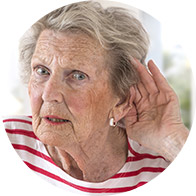How to handle the symptoms of hearing loss
If you notice that you or a loved one is experiencing signs of hearing loss, we recommend you to seek advice from a hearing care specialist, at one of our Audika clinics.
At Audika we offer 3 types of hearing tests to determine your level of hearing loss:
1. AMTAS - computer test using specific hearing software (15 mins)
2. A screening test with a Clinician (30 mins)
3. A comprehensive test with a Clinician (60 mins)
Whether you book online, submit a website request, call us or contact our clinic directly, we will determine the most suitable hearing test for your needs.
You can also start out by taking our online hearing test3. It takes about 5 minutes and gives you a quick assessment regarding whether you show signs of hearing loss.
Book an appointment














